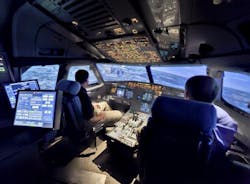Airlines Ready For A Pilot Hiring Spree
Feb. 24--Mike Powers got hooked on flying when he was 8 years old and a family friend took him for a ride in her Cessna 150 and let him take the controls. For Powers, becoming an airline pilot became his singular goal and, at that time in the late 1990s, it seemed like a reasonable career choice.
But the 2000s brought a different story: airline bankruptcies, consolidation and the recession. When Powers graduated from Embry-Riddle Aeronautical University in Arizona in 2010, he found himself in line behind thousands of experienced airline pilots who had been furloughed.
Now, after eight years of study and work as a flight instructor, Powers, 25, is within months of landing the airline job he always dreamed of.
As it turned out, Powers' timing is perfect. A wave of retirements, new competition from international airlines and more rigorous training requirements have industry officials now worried about a pilot shortage.
In its annual forecast last year, Boeing estimated airlines worldwide will need 498,000 new pilots over the next 20 years, 85,700 in North America alone. A 2012 University of North Dakota Aviation Department study projected the U.S. will fall 38,000 short of the commercial pilots needed during the next two decades. The U.S. had nearly 262,000 commercial and certified air transport pilots in 2012, according to the Federal Aviation Administration.
Not everyone agrees with the dire forecast. The Air Line Pilots Association, which represents 50,000 pilots, earlier this month flatly denied any shortage, noting the union currently has 1,154 members on furlough from airlines, including more than 850 from Comair Airlines, the regional carrier that shut down in 2012.
But Kit Darby, a retired United Airlines pilot who is now a consultant, said industry demand will quickly outstrip the furloughed pilots and the declining pool of military aviators available. He predicts an upcoming airline hiring spree the likes of which hasn't been seen in 50 years.
"It's a generational opportunity," Darby said.
Darby said the major airlines shouldn't have any problem filling their positions because of the high pay -- first officers average nearly $106,000 after five years -- and lucrative benefits. However the regional carriers, with a starting pay of $22,000 to $25,000, may be left scrambling for pilots, who can pay as much as $100,000 to get through private pilot school and earn the flying hours needed to be eligible for an airline job.
Powers and three other flight instructors at John Wayne Airport's Sunrise Aviation are taking advantage of a program initiated last year by SkyWest, a Utah-based regional carrier that operates SkyWest and ExpressJet airlines for United, Delta Air Lines, American/US Airways and Alaska Airlines.
Under the program, SkyWest identifies potential recruits at flight schools as they work toward meeting the Federal Aviation Administration's airline transport pilot requirements.
Although they aren't on SkyWest's payroll, the pilot cadets start earning priority seniority at the airline when they enter the program.
Once the pilot cadets complete the FAA requirements -- at least 1,500 hours of total time as a pilot, 500 hours of cross-country flight time, 100 hours of night flying and 75 hours of instruments flight time -- and pass the airline transport pilot exam, SkyWest guarantees them a final job interview.
"It gives them a little bit of a leg up over our other applicants," said Wes Horrocks, the airline's spokesman.
SkyWest's guarantee of a job interview and its good reputation as an employer attracted Ken Poulson, another Sunrise Aviation flight instructor at John Wayne, to the carrier's pilot cadet program.
Poulson, 39, decided to make a career change about five years ago when the recession ravaged his construction business in Oregon. Although he had other choices as a pilot, like charter work, Poulson opted for SkyWest.
He said flying charters would pay better than the $22,000 to $26,000 he will make his first year at SkyWest. But Poulson said charters mean being on call 24/7 and working most holidays. SkyWest's pay increases substantially after the first year, although it is still lower than that of the major airlines.
"I like the schedule and the flight benefits (at SkyWest) -- working four days a week," Poulson said. Remembering his days in construction, he also liked the fact SkyWest has never had layoffs in its 40 years in business.
Poulson is getting ready to study for the rigorous airline transport pilot's exam but confident he will pass and soon will be working for SkyWest.
"The job is pretty much ours for the taking," Poulson said.
Contact the writer: 714-796-3646 or [email protected]
Copyright 2014 - The Orange County Register
